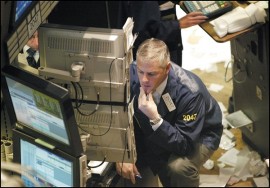
It is 20 years ago that the UK fell out of the Exchange Rate Mechanism, an important anniversary for both pro-Europeans and their opponents. The opponents of course claim that the failure of the ERM shows that fixed exchange rates between countries are a bad idea and that the euro is failing for the same reasons.
Supporters of the euro point out that the ERM was not a regime of fixed exchange rates but of fixed but changeable exchange rates – the “but changeable” is very important, there having been 42 adjustments of a national currency against the central parity before the crisis hit in September 1992.
And the ERM did not fail but it succeeded. Some currencies left but most of them stayed in and it served its purpose of keeping them stable enough against each other to be able to establish the euro in 1999.
What failed was British membership of the ERM. The UK government treated it as a fixed exchange rate system, and not a fixed but changeable one. Of the 42 national adjustments, not one had been British. Germany adjusted 8 times, France 7, Ireland 5, but the UK not at all. So when the UK rate in the ERM of £1 = DEM 2.95 came under pressure, the option to devalue within the system was there and should have been taken but was not. The British government naively assumed that it did not have to go to the same efforts as the other European countries in order to adapt to the new macro-economic environment, and its credibility was destroyed as a result of this error.
In the Daily Telegraph today, Martin Vander Weyer writes that the crash of the pound out of the ERM marked the moment at which power shifted from governments to the markets. Traders were betting against their own national currencies in order to make money, actions that might previously have been seen as unconscionably unpatriotic. The search for profit had become more important than the idea of the nation.
The liberalisation of capital controls from the 1970s onwards, progressively across the western world, made it legally possible for traders to act in this way, and the neo-liberal revolution in mindset made it morally possible. Now, federalists welcome it when the idea of the nation is no longer used as a means of preventing people from making money, but Martin Vander Weyer’s conclusion is the wrong one.
Stampeding markets could overwhelm the firepower of the central banking system in a matter of hours. Invisible investors like Soros, owing no allegiance as citizens, could place bets big enough to change economic outcomes for entire nations. That was how the future was going to be, and 20 years on it should still frighten us all.
The future doesn’t have to be like that: we do not have to be frightened. What we have to do is to match the globalisation of the financial markets with a globalised supervision of those financial markets. That means effective trading rules that ensure fair play and free competition, the elimination of the gaps that exist between national regulatory systems, the recognition that the global market needs an effective central banking system, and the closure of all those tax loopholes and tax havens by which the rich pay less than their fair share.
It is right that national borders should not be used to prevent people from making money, but equally it is wrong when their retention is the means by which people make money, too.
Clinging on to national and inadequate systems of financial regulation is no answer to the forces of modern global trade, and trying to cling on to them simply allows the people behind that trade to make more money than they otherwise would. It is no accident, perhaps, that the people involved in that trade should be so opposed to effective regulation of the financial markets, but there is no reason why the rest of us should have to agree, regardless of what the Daily Telegraph says. The future does not have to be like that.
